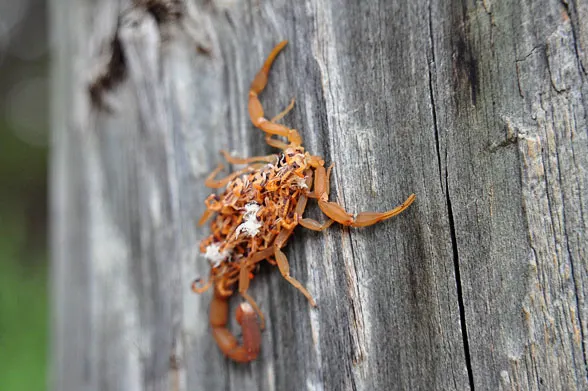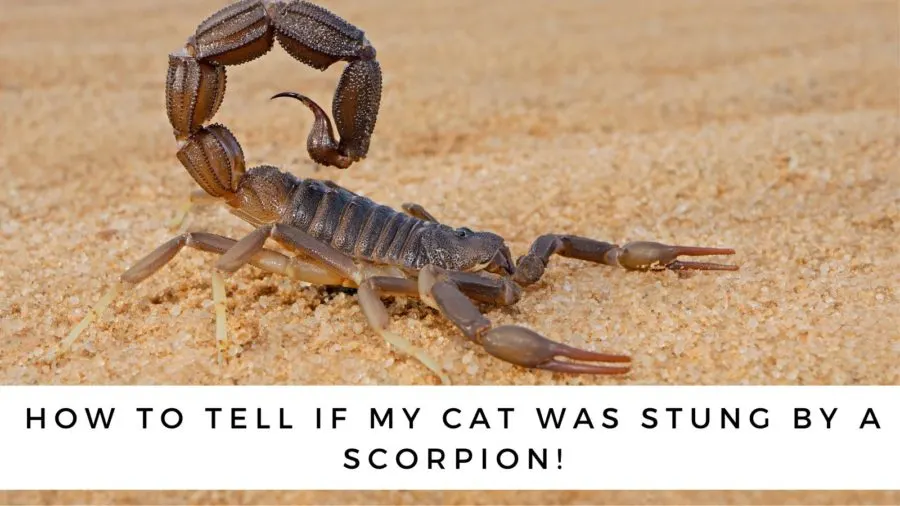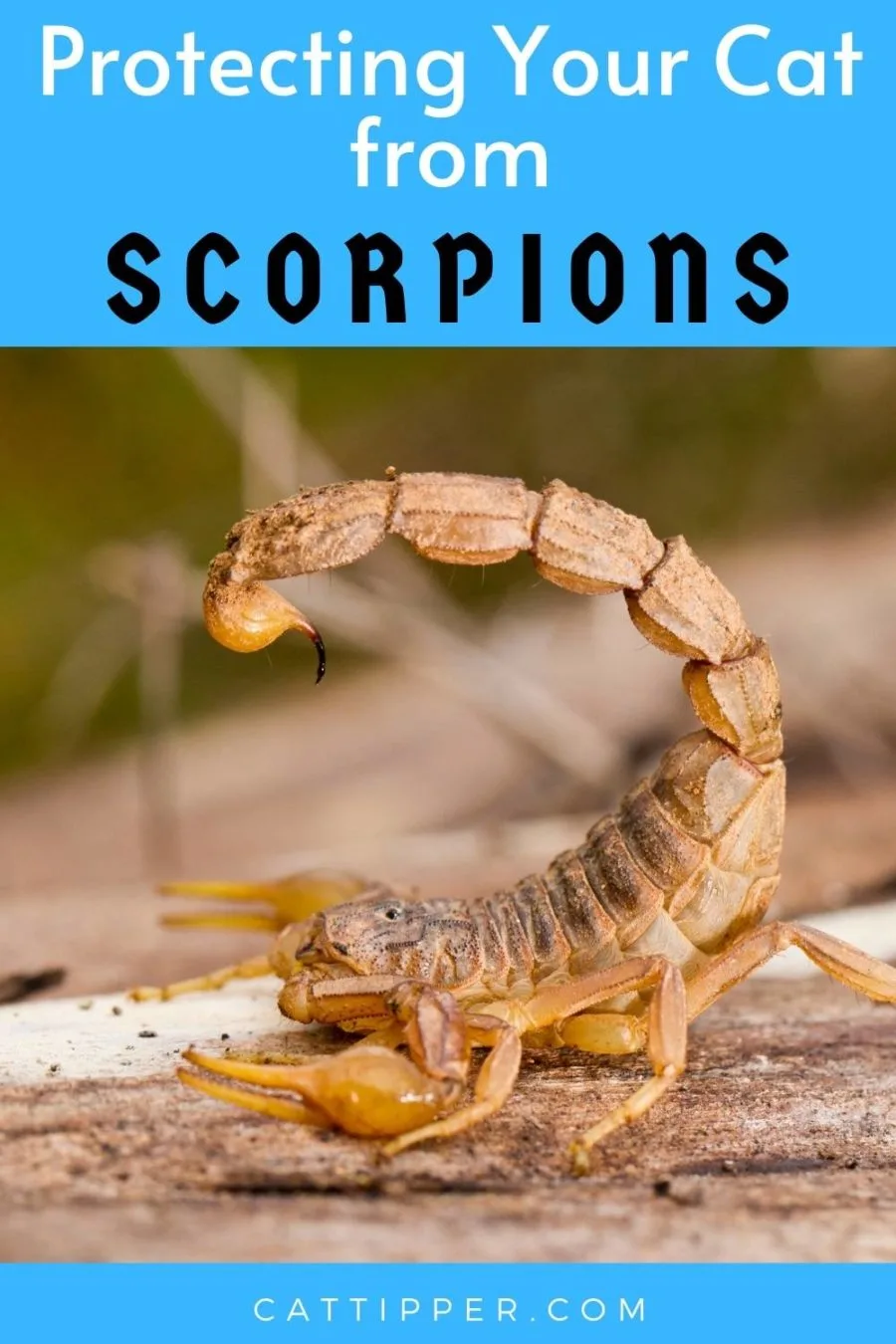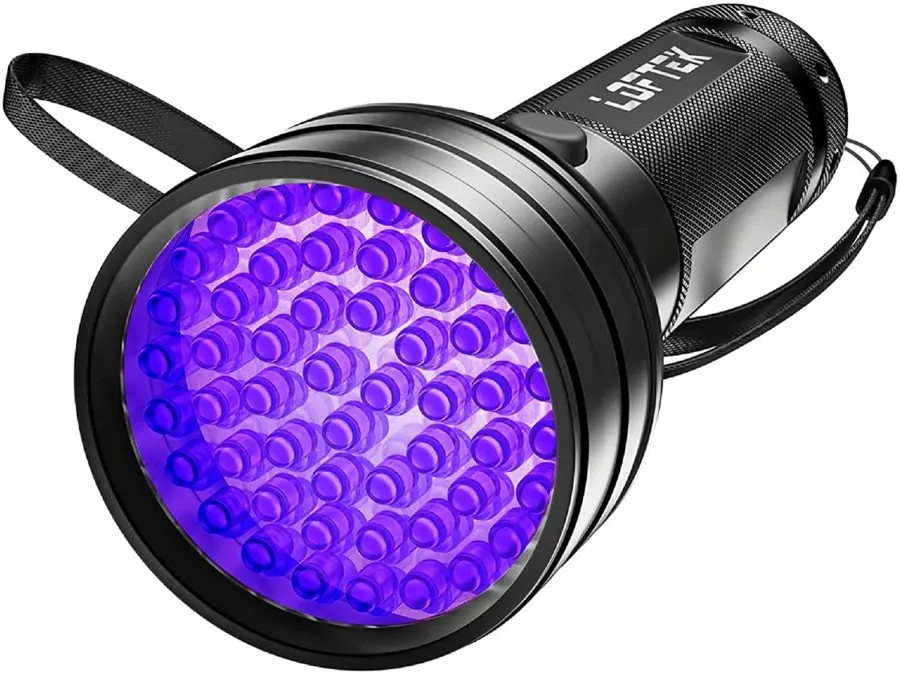Scorpions are a fact of life if you live in the Southwest United States and other arid regions. Here in central Texas, we see the striped bark scorpion, a fairly small scorpion who is difficult to see and often comes out at night. Our cats can sure see them, though, and seem drawn to the slow movement of the scorpion–and that puts them at risk for a scorpion sting.
If you are concerned about keeping your cat safe from scorpions, we’ve got tips on how to avoid having scorpions in and around your home, how to tell if your cat was stung by a scorpion–and veterinary advice on what to do if your cat is stung by a scorpion.

When are scorpions commonly seen?
Summer (which here in Texas continues into October) is the peak season for scorpions but bark scorpions are seen year around. They often try to come inside for water during dry spells. Usually we’ve seen them later in the summer as the weather turns hotter and drier.
Where are scorpions found?
If your cat is outdoors, the most common places to spot a scorpion are dark, damp places such as:
- around wood piles
- under rocks
- beneath logs
- under anything that’s providing dark cover such as a bucket, water bowl, cat bed or pillow
Inside the house, scorpions often are found around water (since they’ve frequently come in for water).
We’ve found scorpions in the sink, in damp dish towels and bath towels, inside damp shoes…but also just marching across the living room floor.
Cats and Scorpions
Scorpions are typically active during the nighttime hours, although they can be seen any time of day…just look at this photo of a mama scorpion with babies all on her back.
I saw her on our gate post in the middle of the day a few years ago:

The interactions between scorpions and cats seem to mostly take place at night, however. I’ve gotten up a few times in the night to see the outline of one of our cats frozen and obviously staring at something in the dark.
Flip on the lights…and there’s a scorpion.
I’ve also found a few dead scorpions in the morning…probably proof that our cats have been hunting during the evening.
How to see scorpions in the dark
You don’t have to be a cat to see scorpions in the dark, though. An inexpensive UV flashlight will illuminate scorpions…in a dark room they glow under UV light just like cat urine does!
Veterinary advice
Prevention is best for avoiding a scorpion sting altogether. I’ve been stung four times, and it is a very painful experience.
Below we have some expert advice on cats and scorpions from the College of Veterinary Medicine & Biomedical Sciences, Texas A&M University and the Pet Talk website:
Curious cats are always eager to investigate anything moving across the carpet or in the grass.
If that object of your pets’ curiosity is a scorpion, your pet may find itself in a situation worse than just getting painfully stung – your animal can be in a potentially dangerous situation.
Dr. Dalton Hindmarsh, a veterinary resident at the Texas A&M University College of Veterinary Medicine & Biomedical Sciences (CVMBS), explains what our pets may encounter when it comes to scorpions, and how to treat, as well as prevent, their painful stings.
Texas is home to more than 18 species of these eight-legged critters, which can be recognized by their distinctive curved tail that curls up and over its back.
To avoid being stung by scorpions, it is helpful to understand their habits as well as their natural habitats; they are naturally attracted to humid conditions and are particularly active during the rainy season.
“Scorpions are nocturnal and come out at night. During hot, dry weather, scorpions may seek water or shelter indoors,” Hindmarsh said. “Their bodies are flat, which allows them to hide in small cracks, under rocks, wood piles, or other debris.”
Because of this, pet owners often do not see scorpions lurking around and may only learn of their pet’s proximity to one after hearing a yelp.
“The best way to minimize the risk of scorpion encounters is to keep debris away from the house, sealing cracks/crevices, and treating with pesticides,” Hindmarsh said.
And for the pooches or kitties that cannot resist a good dig, Hindmarsh advises keeping a watchful eye on what they could unearth.
Cat stung by scorpion? Symptoms to watch for!

Although most scorpion stings are not lethal, they do have a common factor – they are painful.
To respond appropriately to scorpion stings, it is crucial to recognize the symptoms, which almost always include lameness or limping.
“Scorpion stings cause a painful numbness to tingling sensation, which usually resolves in a few hours,” Hindmarsh said. “Some dogs may also develop a slight self-resolving cough.
“It is also possible for an allergic reaction to develop, which could range from mild, localized swelling, hives, and itching to life threatening vomiting, diarrhea, respiratory distress, and/or collapse,” he said.
What to do for cat stung by scorpion
There is a wide range of severity when it comes to scorpion stings, so it is imperative to stay sharp on scorpion prevention and take quick action when necessary.
Veterinary care should be sought immediately if pet owners see any of these signs or suspect their pet has been stung by a scorpion. It is imperative that scorpion stings be treated urgently, Hindmarsh said, even though the majority are not fatal.
“Owners should monitor for signs of an allergic reaction and seek further veterinary care if an allergic reaction develops or their pet has progressive pain (i.e. continued limping),” Hindmarsh advised.
“I would not recommend giving any over-the-counter medications without first consulting a veterinarian.”
Scorpion stings can be scary, but by taking the right precautions and veterinary actions, pet owners are much more capable of taking the bite out of the scorpion and returning the bark back to their furry friends.
FAQ
Can cats get stung by scorpions?
Yep, just like us, cats can get stung by a scorpion, either accidentally (perhaps one is hidden by the water bowl) or when trying to kill a scorpion.
What do I do if my cat is stung by a bark scorpion?
The Arizona bark scorpion is the most venomous scorpion in North America. Its sting can cause significant pain, swelling, numbness, and more severe systemic reactions, especially in vulnerable populations including possibly pets. This species is primarily found in the southwestern United States, especially Arizona, and parts of Mexico.
On the other hand, the striped bark scorpion is also found in parts of the southern and central United States. While its sting can be painful and cause localized reactions, it is usually not as severe or life-threatening as the sting from the Arizona bark scorpion. Systemic reactions from striped bark scorpion stings are less common.
In either case, if your cat is stung by a scorpion, it’s crucial to monitor for adverse reactions listed above and seek veterinary attention if severe symptoms develop.
Are cats immune to scorpions?
Oh, if only they were immune to the scorpion sting! Their fast moves prevent many stings but unfortunately cats are NOT immune to the venom of a scorpion. As you can see from the veterinary advice above, scorpion stings cause pain with the chance of allergic reactions.
Can a cat kill a scorpion?
Our cats have most definitely killed scorpions. If I see them eyeing one, however, I always step in to remove the scorpion before it can sting our cats!
Can a scorpion bite a cat?
Scorpions defend themselves by stinging, usually not by biting (although they could pinch with their pincers). The stinger is located on the tip of that whip-like tail and looks like a tiny needle that delivers the venom.
Pin it to remember

- 🎉 GIVEAWAY: Lord of the Pets Portrait of Your Cat! - November 26, 2024
- Review: Lord of the Pets Cat Portraits! - November 26, 2024
- Cat Adoption: FAQ You Might Have - June 28, 2024

